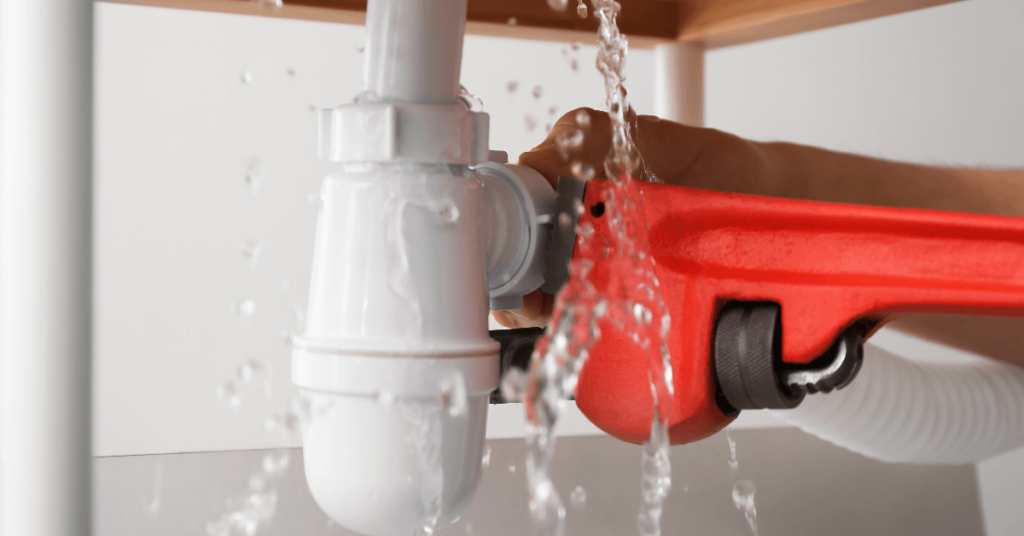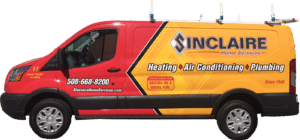Essential Plumbing Maintenance Tips: Answers to Common FAQs
BLOG CATEGORIES
140 South St., Walpole, MA 02081
P (508) 668-8200 Toll Free (877) 668-8822
info@sinclaireboston.com
Master Plumber License #9530,
Sheet Metal Master-Unrestricted #5442
Sinclaire Enterprises, Inc.
140 South St., Walpole, MA 02081
P 508.668.8200 Toll Free 877.668.8822 info@sinclaireboston.com
Master Plumber License #9530,
Sheet Metal Master-Unrestricted #5442
need service?
let us contact you

Regular plumbing maintenance is essential for maintaining your home’s system. It helps prevent unexpected issues, ensures the efficiency and longevity of your pipes and fixtures, and allows you to avoid costly repairs and inconvenient disruptions. Many homeowners are unsure when to schedule maintenance or if it’s even worth the effort, but rest assured, it is. In this blog post, we’ll explore the importance of regular plumbing maintenance and provide practical tips for keeping your plumbing system in optimal shape.
Benefits of Regular Plumbing Maintenance
Taking care of your plumbing system offers numerous benefits, from avoiding expensive issues to improving water quality. Here’s why regular maintenance should be a priority:
Preventing Major Issues
Regular maintenance helps catch minor problems early, preventing them from turning into significant, costly repairs. For example, minor leaks can escalate into pipe bursts if not addressed promptly, leading to extensive water damage and expensive emergency repairs. Routine checks can also detect and prevent pipe corrosion, blockages, and sewer line problems before they cause severe disruptions.
Extending the Lifespan of Plumbing Systems
Routine checks and maintenance significantly extend the life of your plumbing system. Well-maintained plumbing can last decades longer than neglected systems. For instance, water heaters typically last around 8-12 years, but with proper maintenance, they can last up to 15-20 years. Similarly, regularly maintained pipes and fixtures can avoid premature wear and tear, saving you the cost of early replacements.
Improving Water Quality
Maintaining your plumbing system ensures cleaner and safer water. Regular inspections and cleanings help remove buildup and contaminants, providing fresh, high-quality water. This is especially important for drinking water and preventing issues like mineral buildup, which can affect the taste and safety of your water supply.
Enhancing Efficiency
Efficient plumbing systems conserve water and energy. Regular maintenance keeps water heaters, faucets, and other fixtures running smoothly, reducing waste and lowering utility bills. For example, a well-maintained water heater can heat water more efficiently, reducing energy consumption and costs.
Cost Savings
Preventive maintenance can save money by avoiding expensive emergency repairs and reducing water bills. An efficient plumbing system requires less energy, translating to cost savings over time. Regular maintenance costs are relatively low compared to the potential expenses of fixing major plumbing failures.
What’s Included in a Routine Plumbing Maintenance?
Professional plumbing maintenance services cover a comprehensive range of checks and tasks to keep your plumbing system in top condition. Here’s what you can expect:
Inspecting Pipes and Fixtures
Professionals will thoroughly inspect your pipes and fixtures for leaks, corrosion, and signs of wear and tear. This includes checking under sinks, around toilets, and in exposed areas. They use specialized tools to detect issues that may not be visible to the naked eye, ensuring early detection and prevention of potential problems.
Flushing Water Heater
Technicians will flush your water heater to remove sediment buildup and inspect all components for signs of wear. They will also check the thermostat and pressure relief valve to ensure your water heater operates safely and efficiently. Regular maintenance can prevent unexpected breakdowns and extend the life of your water heater.
Clearing Drains and Sewers
Professional drain cleaning services remove buildup and debris from drains and sewer lines. Technicians use advanced equipment, such as hydro-jetting and drain snakes, to clear even the most stubborn clogs and ensure smooth water flow. This prevents backups and protects your home from water damage.
Testing Water Pressure
Professionals will test your water pressure to ensure it is within a safe and efficient range. They will adjust if necessary and check for any underlying issues causing abnormal pressure levels. Proper water pressure prevents pipe strain and improves the performance of your plumbing fixtures.
Checking for Hidden Leaks
Professionals can use advanced techniques, such as thermal imaging and acoustic leak detection, to identify hidden leaks behind walls and under floors. Early detection of hidden leaks prevents extensive water damage and costly repairs. This proactive approach also protects your home’s structural integrity and prevents mold growth.
DIY Maintenance Tips
While professional maintenance is crucial, there are several simple tasks you can do yourself to keep your plumbing in good condition between professional visits. These DIY tips help maintain your plumbing system’s efficiency and prevent minor issues from escalating.
Here’s how you can complement professional plumbing maintenance with regular DIY care:
- Regularly check for leaks: Inspect visible pipes and fixtures for any signs of leaks.
- Keep drains clear: Use drain guards and clean your drains regularly to prevent clogs.
- Flush water heaters: Flush your water heater annually to remove sediment buildup.
- Monitor water pressure: Check your pressure with a gauge and adjust as needed.
Plumbing Maintenance FAQs
Proper plumbing maintenance is essential for the health and efficiency of your home’s plumbing system. However, many homeowners have questions about the best practices and frequency of maintenance tasks. Below, we address some common plumbing maintenance FAQs to help you keep your system running smoothly and efficiently.
How often should I get plumbing maintenance services?
You should schedule professional plumbing maintenance services at least once a year. Annual inspections help identify and address potential issues before they become a problem. For older homes or properties with a history of plumbing issues, semi-annual maintenance may be beneficial to ensure everything remains in optimal condition.
Should plumbing system maintenance always be left to professional plumbers?
Yes, most plumbing maintenance tasks should be left to professionals to ensure any problems are addressed effectively. While homeowners can manage simple tasks like checking for leaks and keeping drains clear, professionals should handle more complicated tasks. Professional plumbers have the expertise and tools to handle complex issues and conduct thorough inspections, which are crucial for maintaining the health of your plumbing system.
How often should you flush your pipes?
You should flush your pipes every one to two years to prevent the buildup of minerals, sediments, and other debris that can cause clogs and reduce water quality. This process helps maintain optimal water flow and pressure throughout your plumbing system. More frequent flushing may be necessary in areas with hard water to prevent scale buildup.
How can regular maintenance prevent pipe corrosion?
Regular maintenance helps prevent pipe corrosion by identifying and addressing leaks, improper water pH levels, and mineral buildup. During maintenance, professionals can check for signs of corrosion, ensure that protective coatings on pipes are intact, and recommend water treatment solutions like water softeners to minimize corrosive elements in your water supply. Early detection and treatment of corrosion can significantly extend the lifespan of your pipes.
How frequently should I inspect and clean my gutters to protect my plumbing system?
You should inspect and clean your gutters at least twice a year, typically in the spring and fall. Regular gutter maintenance prevents blockages that can cause water to overflow and damage your home’s foundation, basement, and plumbing system. More frequent inspections and cleanings may be necessary to ensure your gutters function properly in areas with heavy foliage or frequent storms.
How can I tell if my plumbing system is bad?
Recognizing the signs of a failing plumbing system early can save you from costly repairs and extensive damage. Common indicators of a faulty plumbing system include:
- Low Water Pressure: Consistently low water pressure throughout your home can signal a serious issue, such as pipe corrosion, leaks, or a blockage.
- Slow Drains: If your sinks, showers, or tubs are draining slowly, it could indicate a clog or buildup in your pipes.
Frequent Leaks: Regularly finding leaks or water damage in your home is a huge red flag that your plumbing system may need significant repairs or replacement. - Unpleasant Odors: Foul smells from your drains or around your home can indicate sewage backup or trapped debris, requiring immediate attention.
- Discolored Water: Rusty or cloudy water can signify pipe corrosion or water supply issues.
- Noisy Pipes: Banging, gurgling, or other unusual noises in your pipes can indicate problems like air in the lines, loose connections, or pressure issues.
- High Water Bills: A sudden increase in your water bill without an apparent cause may suggest a hidden leak or inefficiency in your plumbing system.
Choose Sinclaire for Your Plumbing Maintenance Needs
Regular plumbing maintenance is essential for ensuring your home’s plumbing system’s longevity, efficiency, and safety. By taking proactive steps, you can avoid future issues, save money, and enjoy peace of mind.
Trust the experts at Sinclaire Home Services for all your plumbing maintenance needs. Our certified professionals are committed to delivering top-notch service and keeping your plumbing in top condition.
Whether you’re searching for plumbers in Walpole, MA, or plumbers in Canton, MA, Sinclaire Home Services is the number one choice. Contact us today to schedule a comprehensive inspection and experience the difference.
OUR SERVICE AREAS
- Ashland, Ma
- Attleboro, Ma
- Bellingham, Ma
- BLACKSTONE, MA
- BRIDGEWATER, MA
- Canton, Ma
- Dedham, Ma
- Dover, Ma
- EAST BRIDGEWATER, MA
- Easton, Ma
- Foxborough, Ma
- Framingham, Ma
- Franklin, Ma
- Holliston, Ma
- HOPEDALE, MA
- Hopkinton, Ma
- Mansfield, Ma
- Medfield, Ma
- Medway, Ma
- MENDON, MA
- MILFORD, MA
- MILLIS, MA
- MILLVILLE, MA
- MILTON, MA
- NATICK, MA
- NEEDHAM, MA
- NEWTON, MA
- NORFOLK, MA
- NORTH ATTLEBORO, MA
- NORTON, MA
- NORWOOD, MA
- PLAINVILLE, MA
- RANDOLPH, MA
- RAYNHAM, MA
- SHARON, MA
- SHERBORN, MA
- STOUGHTON, MA
- SUDBURY, MA
- TAUNTON, MA
- WALPOLE, MA
- WAYLAND, MA
- WELLESLEY, MA
- WEST BRIDGEWATER, MA
- WEST ROXBURY, MA
- WESTON, MA
- WESTWOOD, MA
- WRENTHAM, MA
AFFILIATIONS





